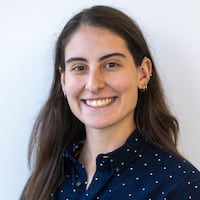Identifying as both Jewish and queer means belonging to two marginalized groups simultaneously, according to several Jews who gathered Friday night for Pride Shabbat, an event that helped kick off Pride weekend in Atlanta.
But the sense of worry has strongly intensified since last weekend’s attacks by Hamas in Israel. Despite the ongoing war and the heightened unease among queer Jews who attended the event, many still wanted to celebrate Shabbat and Pride in Atlanta and to pray for those who have been impacted by the conflict.
“Even though we have this sad undertone, that cannot affect people gathering to celebrate who they are. Everyone deserves that,” said Lisa Stoch, director of development at the Southern Jewish Resource Network for Gender and Sexual Diversity (SOJOURN).
On Oct. 7, thousands of rockets targeted towns and cities throughout Israel. Gunmen from Hamas, the armed Palestinian group that controls the Gaza Strip, crossed the border and killed civilians in their homes and abducted others. In all, about 1,300 Israelis were killed over the course of Hamas’ assault. In the Gaza Strip, retaliatory airstrikes have killed roughly 1,500 Palestinians, according to Gazan health officials, and Israel imposed blockades on all electricity, food, fuel and water.
Israel’s military directed the evacuation of all civilians living in Gaza City on Friday ahead of a possible ground assault, the Associated Press reported. Former Hamas chief Khaled Meshaal also called for demonstrations across the globe Friday in support of Palestinians.
Atlanta Pride Shabbat, an intimate gathering hosted by SOJOURN and the Jewish Federation of Greater Atlanta, was scheduled to be held at Piedmont Park. Security concerns due to potential demonstrations in response to the war, however, triggered a change to a private location. The Atlanta Journal-Constitution agreed to keep the location private due to the organizations’ concerns over security.
“We have more than quadrupled what we’re doing from a security perspective. I wouldn’t have set this up in the way that I am right now had that threat not happened, had the attack in Israel not happened,” said Samantha Kurgan, vice president of innovation and Jewish engagement with the Jewish Federation, adding that the event was instead held indoors and required registration.
For Rabbi Joshua Lesser, who founded SOJOURN after identifying the need for an organization that tended to the entire Jewish community, security concerns were difficult to ignore. While he said he had heightened anxieties, he emphasized the community’s resilience and stressed that gathering during times of sorrow is essential. He said Friday’s event highlighted two contrasting emotions: joy and suffering.
“Part of what I have wanted to do in thinking about the service is be able to give people permission to tap into a sense of joy, but also really speak to the pain and confusion that we are in,” he explained.
Despite several attendees expressing worry during the service for those impacted by the war, Lesser said Pride Shabbat is about embracing oneself. It’s about the ability to claim one’s identity amid pressure and hostility.
He pointed out that the atmosphere in the room during the evening’s event felt like a model of an ideal Jewish world, where people with different experiences could unite and express their thoughts without feeling silenced or judged.
Shabbat, a Jewish day of rest, occurs weekly and serves as a chance for many to pause and find respite from the turmoil experienced in the preceding days. For Spencer Perdeck, Pride Shabbat offered a moment to disconnect from the ongoing horrors affecting both Israelis and Palestinians.
“I think I felt every emotion under the sun a million times in the past week, and being able to be here and actually feel joy for the first time in an entire week and not be glued to my phone, and Shabbat is that wisdom that gives us that permission to unplug,” said Perdeck, who serves as the Atlanta field manager for OneTable, a national nonprofit that aims to help people find Shabbat dinners every Friday night.
Perdeck said Shabbat feels like a gift every week, especially during challenging times as he and others navigate the grief accompanying the war. He said he was grateful for the opportunity to gather with other Jews in a safe environment and celebrate both his Jewish and queer identities.
While the war dominates the thoughts of Israelis worldwide, Jewish organization leaders said Pride Shabbat was going to happen regardless. They said that allowing potential threats to disrupt the celebration would only exacerbate the impact on the community.
“People fear what they do not understand and cannot comprehend. And it’s not easy being a queer person living in the South,” Stoch said, adding that Pride Shabbat symbolizes the Jewish community standing up for the LGBTQ+ community and saying, “‘We see you, we hear you, you’re a part of our community, you are welcome, and we stand by you.’”
About the Author
The Latest
Featured



